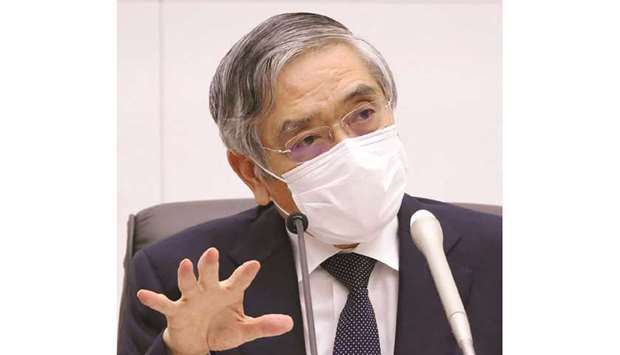Japan’s central bank yesterday said it would maintain its ultra-loose monetary policy as the virus-hit economy gradually picks up, with no big changes announced the day after new Prime Minister Yoshihide Suga took office.
Suga has pledged to continue the work of former leader Shinzo Abe, whose signature “Abenomics” programme involved vast government spending, massive monetary easing and attempts to cut red tape.
The Bank of Japan kept its negative interest rate of 0.1% on bank deposits, as well as its policy of unlimited purchases of Japanese government bonds, to ensure their 10-year yields remain around zero percent. Haruhiko Kuroda, the bank’s governor, said the institution would continue to work closely with the government, adding he has “no plan” to step down before his term ends in 2023.
“As new Prime Minister Suga took office yesterday, we will continue to support the Japanese economy with the current monetary policy,” he told reporters.
Through its stimulus measures, the bank will “make efforts to ensure financing of businesses and stability of financial markets” in the face of the coronavirus pandemic, Kuroda added.
The world’s third largest economy shrank 7.9% in the second quarter of this year — the worst figure since comparable data became available in 1980.
It was in recession even before the coronavirus hit, owing to damage from a powerful typhoon last year, and a sales tax hike in October.
But the bank was slightly more upbeat in its evaluation of the economy’s health than in July — although it warned that the overall outlook remains rocky.
“Japan’s economy has started to pick up with economic activity resuming gradually, although it has remained in a severe situation due to the impact of the novel coronavirus at home and abroad,” it said in a statement yesterday.
While there has been a slow rise in consumption, “the pace of improvement is expected to be only moderate while the impact of Covid-19 remains worldwide”, it warned.
The bank said it would closely monitor the effects of the pandemic on the economy, “and will not hesitate to take additional measures if necessary”. In its July quarterly report, the bank said Japan’s economy would contract 4.7% in the year to March 2021, projecting a recovery the following year but adding that deep uncertainty remains.
Since March, the bank has taken a series of measures to cushion the impact of the coronavirus.
These include strengthening of asset repurchases and establishing mechanisms for zero-interest loans, especially for small and medium-sized businesses.
“Until the new administration gets settled, the BoJ will sit on the fence and monitor the effect of its policy unless markets move a lot,” Nobuyasu Atago, economist at Okasan Securities, told Bloomberg News.
The bank also kept its inflation target of 2%, which aims to end the deflation that has long haunted the Japanese economy, but so far has remained stubbornly out of reach.

BoJ governor Haruhiko Kuroda speaks during a press conference at the bank’s headquarters in Tokyo yesterday.
